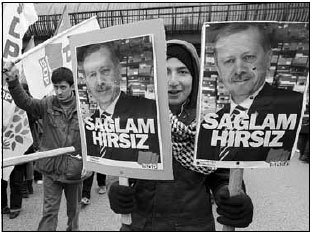Turkey's political civil war could weaken Erdogan
Turkish Prime Minister Tayyip Erdogan looks to have the upper hand in a civil war rocking the country's political establishment, but his bid to break the influence of a potent Islamic cleric could roll back reforms and undermine hard-won business confidence.
What erupted a month ago as a damaging inquiry into alleged government corruption has spiraled into a battle over the judiciary with potentially much further-reaching consequences for the country's international image and Erdogan's own future.
"There is considerable risk of Turkey losing the gains in credibility and investment it has won in the past decade," a senior Turkish banker said, declining to be named for fear of repercussions for publicly criticizing the government.
Despite fistfights in parliament, the opposition looks unable to prevent Erdogan's plan to put the appointment of judges, held to be under the sway of US-based cleric Fethullah Gulen, more under government control.
In power since 2003, Erdogan has led what Ankara, the United States and Europe long held up as a potential model for Islamic democracy and stability for Arab states.
But a crackdown in June on anti-government protests and his response to the graft inquiry, his critics say, has betrayed increasingly authoritarian tendencies.
"Everyone knows that this plan to keep the judiciary under political control is not constitutional and is not democratic," said Koray Caliskan, an associate political science professor at Istanbul's Bogazici University.
The prime minister says the graft inquiry is an attempted "judicial coup" by a "parallel state", a thinly veiled reference to Gulen's influence in the judiciary and police, and has purged hundreds of police officers deemed loyal to the cleric, whose followers see him as more progressive and pro-Western.
But while new police officers and judges may slow the graft inquiries, the shakeup could fuel opposition to Erdogan and lead Gulen - a former ally who helped Erdogan's AK Party rise to power - to tacitly side with his opponents in an Istanbul election in March, a key test of the government's popularity.
Details of the corruption allegations have not been made public, but are believed to relate to construction and real estate projects and Turkey's gold trade with Iran, according to Turkish newspaper reports, citing prosecutors' documents.
The government has cast them as a smear campaign, but damage has already been done.
"If a perception takes hold that you can't do business in Turkey without bribing, foreign investors may avoid privatization tenders," said Huseyin Gurer, managing partner in Turkey for Deloitte.
"Investors may also start worrying about the legal system and may start questioning whether their rights will be preserved before the law," he said. "The government should take immediate steps to correct that perception."
Erdogan has overseen strong economic growth in Turkey since coming to power in 2002, transforming its reputation after a series of unstable coalition governments in the 1990s ran into repeated balance of payments problems and economic crises.
Reuters
|
A protester holds a placard with photos of Turkish Prime Minister Recep Tayyip Erdogan that reads "Perfect thief" in Ankara on Saturday, as Turkey starts the new year with a corruption scandal related to several ministers. Burhan Ozbilici / Associated Press |
(China Daily 01/15/2014 page11)









